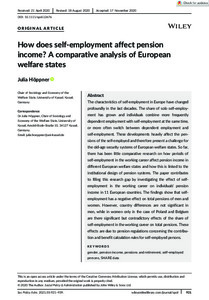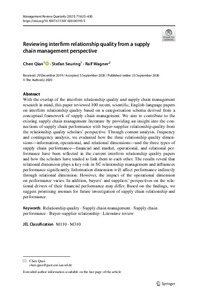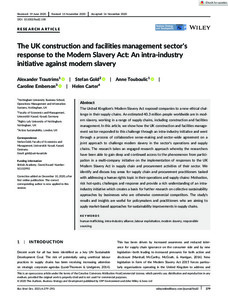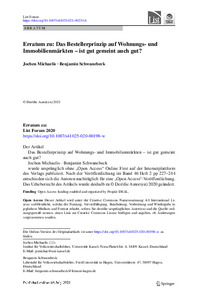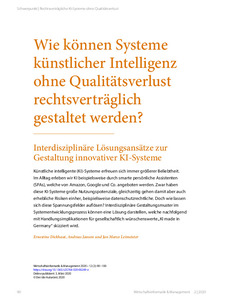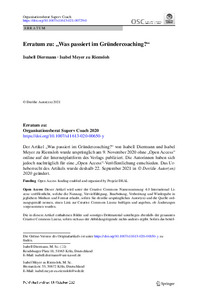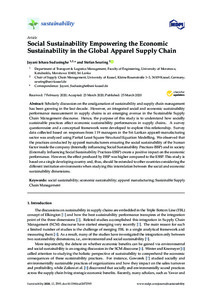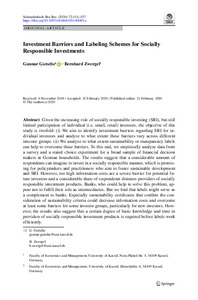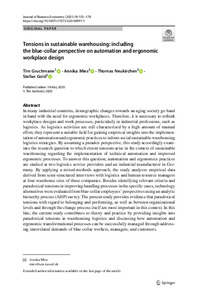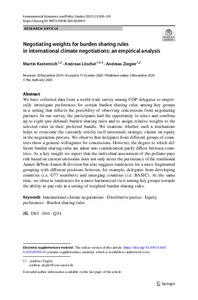Suche
Anzeige der Dokumente 1-10 von 22
Aufsatz

 How does self-employment affect pension income? A comparative analysis of European welfare states
How does self-employment affect pension income? A comparative analysis of European welfare states
(2020-12-03)
The characteristics of self-employment in Europe have changed profoundly in the last decades. The share of solo self-employment has grown and individuals combine more frequently dependent employment with self-employment at the same time, or more often switch between dependent employment and self-employment. These developments heavily affect the pensions of the self-employed and therefore present a challenge for the old-age security systems of European welfare states. So far, there has been little comparative research ...
Aufsatz

 Reviewing interfirm relationship quality from a supply chain management perspective
Reviewing interfirm relationship quality from a supply chain management perspective
(2020-09-23)
With the overlap of the interfirm relationship quality and supply chain management research in mind, this paper reviewed 100 recent, scientific, English-language papers on interfirm relationship quality based on a categorisation schema derived from a conceptual framework of supply chain management. We aim to contribute to the existing supply chain management literature by providing an insight into the connections of supply chain performance with buyer–supplier relationship quality from the relationship quality scholars’ ...
Aufsatz

 The UK construction and facilities management sector's response to the Modern Slavery Act: An intra-industry initiative against modern slavery
The UK construction and facilities management sector's response to the Modern Slavery Act: An intra-industry initiative against modern slavery
(2020-12-02)
The United Kingdom's Modern Slavery Act exposed companies to a new ethical challenge in their supply chains. An estimated 40.3 million people worldwide are in modern slavery, working in a range of supply chains, including construction and facilities management. In this article, we show how the UK construction and facilities management sector responded to this challenge through an intra-industry initiative and went through a process of collaborative sense-making and sector-wide agreement on a joint approach to challenge ...
Aufsatz

 Das Bestellerprinzip auf Wohnungs- und Immobilienmärkten – ist gut gemeint auch gut?
Das Bestellerprinzip auf Wohnungs- und Immobilienmärkten – ist gut gemeint auch gut?
(2020-09-24)
Mit der Implementierung des Bestellerprinzips – wer den Makler beauftragt, muss ihn auch bezahlen – hat der Gesetzgeber einen Wechsel der Zahllast für die Courtage vom Mieter zum Vermieter vorgenommen. Mit Hilfe eines sequentiellen Verhandlungsspiels wird hier diskutiert, inwieweit der Wechsel der Zahllast mit einer Veränderung der ökonomischen Traglast einhergeht. Es wird gezeigt, dass für plausible Parameterkonstellationen (i) die Makler verlieren in Form einer sinkenden Courtage, (ii) die Mieter gewinnen trotz ...
Aufsatz

 Wie können Systeme künstlicher Intelligenz ohne Qualitätsverlust rechtsverträglich gestaltet werden?
Wie können Systeme künstlicher Intelligenz ohne Qualitätsverlust rechtsverträglich gestaltet werden?
(2020-03-03)
Künstliche intelligente (KI)-Systeme erfreuen sich immer größerer Beliebtheit. Im Alltag erleben wir KI beispielsweise durch smarte persönliche Assistenten (SPAs), welche von Amazon, Google und Co. angeboten werden. Zwar haben diese KI-Systeme große Nutzungspotenziale, gleichzeitig gehen damit aber auch erhebliche Risiken einher, beispielsweise datenschutzrechtliche. Doch wie lassen sich diese Spannungsfelder auflösen? Interdisziplinäre Gestaltungsmuster im Systementwicklungsprozess können eine Lösung darstellen, ...
Aufsatz

 Was passiert im Gründercoaching?
Was passiert im Gründercoaching?
(2020-04-16)
Die vorliegende Studie exploriert die Rolle von Prozess- und Expertenberatung im Gründercoaching. Die Ergebnisse einer qualitativen Interviewstudie mit 44 Coaches zeigen, dass beide Modelle im Gründercoaching von Bedeutung sind, wobei deren Gewichtung sehr unterschiedlich ausfallen kann. Innerhalb des Prozessberatungsanteils gehen Coaches auf 17 verschiedene Themen ein, im Expertenberatungsanteil sind vier Themenbereiche relevant. Coaches setzen das jeweilige Beratungsmodell bewusst im Coachingprozess ein und reagieren ...
Aufsatz

 Social Sustainability Empowering the Economic Sustainability in the Global Apparel Supply Chain
Social Sustainability Empowering the Economic Sustainability in the Global Apparel Supply Chain
(2020-03-25)
Scholarly discussion on the amalgamation of sustainability and supply chain management has been growing in the last decade. However, an integrated social and economic sustainability performance measurement in supply chains is an emerging avenue in the Sustainable Supply Chain Management discourse. Hence, the purpose of this study is to understand how socially sustainable practices affect economic sustainability performances in supply chains. A survey questionnaire and a conceptual framework were developed to explore ...
Aufsatz

 Investment Barriers and Labeling Schemes for Socially Responsible Investments
Investment Barriers and Labeling Schemes for Socially Responsible Investments
(2020-02-21)
Given the increasing role of socially responsible investing (SRI), but still limited participation of individual (i.e. small, retail) investors, the objective of this study is twofold: (i) We aim to identify investment barriers regarding SRI for individual investors and analyze to what extent these barriers vary across different investor groups. (ii) We analyze to what extent sustainability or transparency labels can help to overcome these barriers. To this end, we empirically analyze data from a survey and a stated ...
Aufsatz

 Tensions in sustainable warehousing: including the blue-collar perspective on automation and ergonomic workplace design
Tensions in sustainable warehousing: including the blue-collar perspective on automation and ergonomic workplace design
(2020-05-14)
In many industrial countries, demographic changes towards an aging society go hand in hand with the need for ergonomic workplaces. Therefore, it is necessary to rethink workplace designs and work processes, particularly in industrial professions, such as logistics. As logistics activities are still characterized by a high amount of manual effort, they represent a suitable field for gaining empirical insights into the implementation of automation and ergonomic practices to inform social sustainable warehousing logistics ...
Aufsatz

 Negotiating weights for burden sharing rules in international climate negotiations: an empirical analysis
Negotiating weights for burden sharing rules in international climate negotiations: an empirical analysis
(2020-11-03)
We have collected data from a world-wide survey among COP delegates to empirically investigate preferences for certain burden sharing rules among key groups in a setting that reflects the possibility of observing concessions from negotiating partners. In our survey, the participants had the opportunity to select and combine up to eight (pre-defined) burden sharing rules and to assign relative weights to the selected rules in their preferred bundle. We examine whether such a mechanism helps to overcome the currently ...

